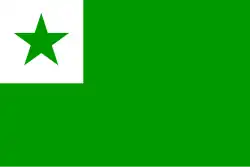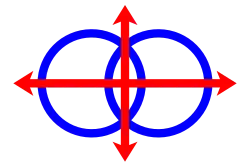Portal:Constructed languages
Introduction

A constructed language is a language for communication between humans (i.e. not with or between computers) but unlike a language that emerges from human interaction, is intentionally devised for a particular purpose. Constructed language is often shortened to conlang and is a relatively broad term that encompasses subcategories including: fictional, artificial, engineered, planned and invented. A constructed language may include natural language aspects including phonology, grammar, orthography, and vocabulary. Interlinguistics includes the study of constructed languages. (Full article...)
Selected language
Brithenig is an invented language, or constructed language ("conlang"). It was created as a hobby in 1996 by Andrew Smith from New Zealand, who also invented the alternate history of Ill Bethisad to "explain" it.
Brithenig was not developed to be used in the real world, like Esperanto or Interlingua, nor to provide detail to a work of fiction, like Klingon from the Star Trek scenarios. Rather, Brithenig started as a thought experiment to create a Romance language that might have evolved if Latin had displaced the native Celtic language as the spoken language of the people in Great Britain. The result is an artificial sister language to French, Catalan, Spanish, Portuguese, Romanian, Occitan and Italian which differs from them by having sound-changes similar to those that affected the Welsh language, and words that are borrowed from the Brittonic languages and from English throughout its pseudo-history. One important distinction between Brithenig and Welsh is that while Welsh is P-Celtic, Latin was a Q-Italic language (as opposed to P-Italic, like Oscan), and this trait was passed onto Brithenig.
Similar efforts to extrapolate Romance languages are Breathanach (influenced by the other branch of Celtic), Judajca (influenced by Hebrew), Þrjótrunn (a non-Ill Bethisad language influenced by Icelandic), Wenedyk (influenced by Polish), and Xliponian (which experienced a Grimm's law-like sound shift). It has also inspired Wessisc, a hypothetical Germanic language influenced by contact with Old Celtic. Find out more...
Did you know...
...that the Marquis Louis de Beaufront, one of the creators of Ido, was not really a marquis?
...that two different constructed languages have claimed the name Interlingua, and one the name Interlingue?
...that Gottfried Leibniz was not only a famous scientist, but also the creator of a language named Characteristica universalis?
Current events
(none)
Corresponding categories

Projects

|
You are invited to participate in WikiProject Constructed languages, a WikiProject dedicated to developing and improving articles about constructed languages. |
Things you can do
-
Join: Constructed Languages WikiProject & add {{Wikipedia:WikiProject Constructed languages/Userbox}}
Follow: Recent changes in related articles
Tag: {{WP conlangs}}, {{Constructed languages}}, and {{Infobox language}} (see WP:CL Templates)
Evaluate: Everything in Category:Unassessed constructed language articles
Report: Edit wars and deletions
Expand: everything in category:Constructed language stubs
Requests:
-
Abakwi, Ancient Language, Arovën, Baza, Bluddian, Dremlang, Eaiea, Eloi, Ekspreso, Esperando, Fasile, Glide, Herman Miller, Language Creation Society, Latejami, Mezhdunarodny Nauchny Yazyk, Mirad, Modern Indo-European, Mondlango, Musbrek, Noxilo, Or'zet, Romanica (rd), Romanova (rd), Signuno, Sperethiel, Szkev, Tceqli/Ceqli, Thosk, Tokcir, Troscann, Unas, UNI, Universalspråket, Vorlin.
Web resources

Some Internet resources relating to constructed languages, by Richard Kennaway
UniLang.org
Conlang wiki
Articles
Wikipedia in constructed languages
Associated Wikimedia
The following Wikimedia Foundation sister projects provide more on this subject:
-
Commons
Free media repository -
Wikibooks
Free textbooks and manuals -
Wikidata
Free knowledge base -
Wikinews
Free-content news -
Wikiquote
Collection of quotations -
Wikisource
Free-content library -
Wikiversity
Free learning tools -
Wiktionary
Dictionary and thesaurus












